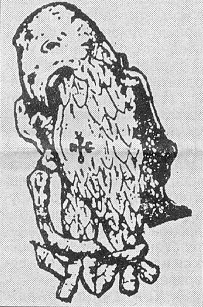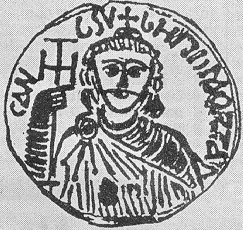 Again in Ukraine, at the village of Voznesenka, there was discovered the
grave of khan Asparukh. It contained a silver eagle with
a cross on its chest and the name of Ispor (one of Asparukh’s names) on
its wing.
Again in Ukraine, at the village of Voznesenka, there was discovered the
grave of khan Asparukh. It contained a silver eagle with
a cross on its chest and the name of Ispor (one of Asparukh’s names) on
its wing.
The Bulgars were Christians even before 865 AD. At that time they had been Arians. They had disputed the sameness of essence of the Son and the Holy Spirit with God the Father, and the christening with water. That is why the 19th decision of the first ecumenical council of the Christian church in Nicaea obliged the arians to be christened again.
Khan Kubrat was a Christian till his death. It is confirmed by the finds from his grave near the village of Malaja Pereshchepina in the Poltava district, Ukraine, discovered in 1912. There are crosses on three of the dishes from the grave, there are more crosses on his sheath, five more crosses - on his sword, and three crosses - on the buckle of his belt.
 Again in Ukraine, at the village of Voznesenka, there was discovered the
grave of khan Asparukh. It contained a silver eagle with
a cross on its chest and the name of Ispor (one of Asparukh’s names) on
its wing.
Again in Ukraine, at the village of Voznesenka, there was discovered the
grave of khan Asparukh. It contained a silver eagle with
a cross on its chest and the name of Ispor (one of Asparukh’s names) on
its wing.
Acad. Ivan Snegarov wrote: “The Byzantine chroniclers do not report that the first Bulgarian khans (Asparukh, Tervel, etc.) were persecutors of the Christianity as a religion.” Leo the Grammarian in its chronicle describing the victory of Asparukh over Constantine IV in 681 AD do not call the Bulgars pagans but ‘ungodly people’, an expression applied then to the heretics.
Paissius of Hylendar states that khan Tervel was a Christian and that he christianized the Bulgars. Paissius wrote his history using “The kingdom of the Bulgars” of Mavro Orbini. Orbini also reported that khan Sabin was also a Christian who was dethroned by a people's assembly because of his iconoclasm. The Madara horseman was carved on the order of Tervel, next to the second inscription there there is a cross.
 There was found a Tervel's seal with the inscription: “Virgin Mary,
assist the caesar Tervel”. On the other side of the seal there
is a cross. There are also found two seals of khan Telerig
with the inscription: “Virgin Mary, help your slave the God
anointed patrician Telerjug”, and a cross. On his golden medallion
khan Omurtag is portrayed with a crown with a cross, and another cross
in his hands. A proof of the existence of the old Bulgarian Christianity
are the 38 Bulgar stone inscriptions. 30 of them have crosses and the text
of the inscriptions as if composed by Christians. The words are addressed
not to Tangra but to ‘God’, and it was the Christian god. The inscriptions
of Omurtag, Malamir and Presian
say: “From the God appointed khan sjuvigi...”. The word ‘God’
was also used by Omurtag at the building of his palace: “Let God
gives him to live for 100 years.” If Omurtag was a pagan, he would
mention Tangra instead.
There was found a Tervel's seal with the inscription: “Virgin Mary,
assist the caesar Tervel”. On the other side of the seal there
is a cross. There are also found two seals of khan Telerig
with the inscription: “Virgin Mary, help your slave the God
anointed patrician Telerjug”, and a cross. On his golden medallion
khan Omurtag is portrayed with a crown with a cross, and another cross
in his hands. A proof of the existence of the old Bulgarian Christianity
are the 38 Bulgar stone inscriptions. 30 of them have crosses and the text
of the inscriptions as if composed by Christians. The words are addressed
not to Tangra but to ‘God’, and it was the Christian god. The inscriptions
of Omurtag, Malamir and Presian
say: “From the God appointed khan sjuvigi...”. The word ‘God’
was also used by Omurtag at the building of his palace: “Let God
gives him to live for 100 years.” If Omurtag was a pagan, he would
mention Tangra instead.
Similar is the case with khan Krum and his inscription from Khambarli: he requests from God to live for many years. In his other inscription Krum requests God to preserve him in his war with emperor Nicephorus. The Bulgarian treasure from Hagy Saint Miklos which probably belonged to khan Omurtag also contains crosses.
The life of the Tiberiopul's saints by Theophilactus of Okhrid records the argument between khan Malamir and his brother Enravot. Enravot says: “I know that you will kill me, but know that here there will be pure churches and pure priests will sing in them”. There were obviously priests in Bulgaria but they were impure, that is - heretical. In his inscription Malamir addresses not Tangra but God: “Long live together with Isbul for many years”. According to prof. Ivan Venedikov the killing of Enravot was not religious but a dynastic one.
Even the commemorative inscriptions with not official state functions bear crosses. An example is that informing about the death of Tudarchis - a candidate under Omurtag , Nevavanon and Korsis. There are found Christian seals belonging to prominent pre-865 AD state officials - such as Bajan, Khumir, Bogatur khana Joan, and Mavr, the latter supposedly being the youngest brother of Asparukh and Kuber. It is indicative that khan Krum's sister was married to the Christian Constantine Pacik. Pacik was a close associate of Krum and accompanied the khan to the negotiations near Constantinople in 813 AD where there was a treacherous attempt on khans’ life while Pacik and his son were captured by the Byzantines. Typically Christian is also the inscription of khan Presian, carved in a Christian temple in Filipi. In it the God anointed khan sjubigi says: “Whoever is looking for the truth, is seen by God, and whoever is lying, is seen by God”.
[Back]